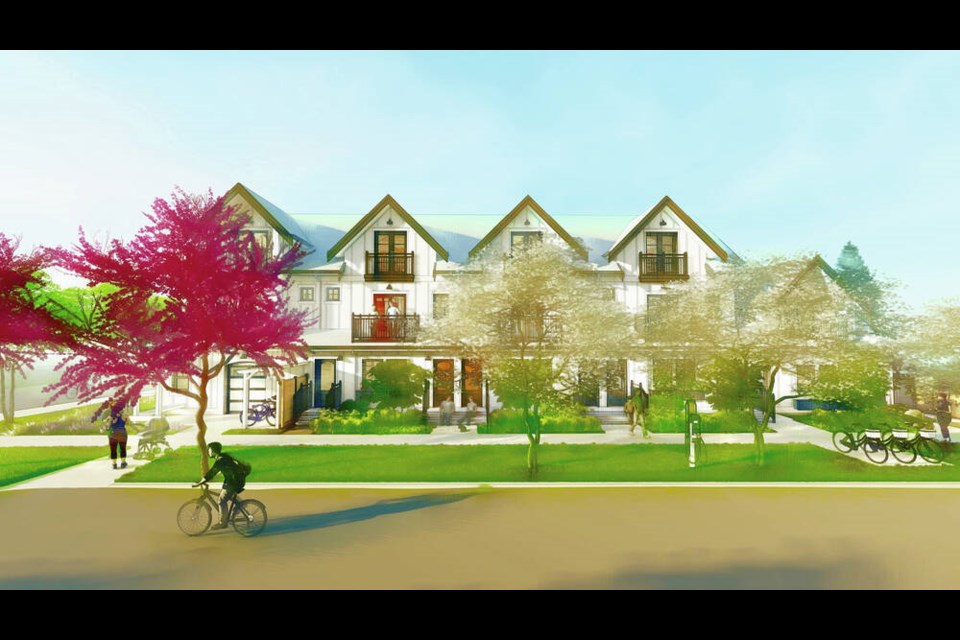The approval of a nine-unit townhouse project with no on-site parking in Saanich is being hailed as a signal times are changing in the municipality, and Saanich is taking steps to address both the housing and climate crises.
Council unanimously approved a rezoning application this week that will see a single-family home at the corner of Richmond Road and Allenby Street replaced with a nine-unit townhouse complex.
Normally for a nine-unit project, 23 parking stalls would be required — 18 for residential units and five for visitors, but no parking is being proposed for the site at 2859 Richmond Rd.
Saanich says it’s the first application approved by council offering no parking.
Developer Urban Thrive says the small townhouse complex will cater to those choosing a car-free lifestyle. The site will include storage for 18 bicycles and space for nine cargo bikes and all residents will receive a Modo car-share membership, while a dedicated car-share space with an electric-vehicle charging unit is planned for Allenby Street.
“It was resounding support from Saanich council, which I think is a really positive and progressive tone for housing and climate policy in Saanich for this term,” said Urban Thrive principal Julian West in an interview.
West said the decision to approve the project sends a signal the district is willing to look beyond traditional housing models.
“That is part of what we’re trying to achieve,” West said. “Part of our mission is to be a catalyst for change, to get people to think a little bit differently about their housing and transportation options. And quite frankly, for those families who want to and can live without a vehicle, we can provide them a home at a better price with more design oriented to fit their lifestyle.”
West said the location is ideal for car-free housing — it’s on a commuter cycling route and close to dedicated bike paths on Foul Bay Road, as well as major bus routes along Richmond Road and Lansdowne Road. It’s also close to major destinations and amenities like Royal Jubilee Hospital and Hillside Shopping Centre.
The project was supported by several speakers during the public hearing this week, despite concerns from residents in the immediate neighbourhood that the project is too big for the predominantly single-family-home area and that it would put more pressure on street parking.
The Camosun Community Association noted during the meeting that it would be impossible to enforce a no-parking rule on residents of the project, echoing the sentiments of many who wrote in or showed up at council saying they simply don’t believe residents won’t have vehicles.
West said Urban Thrive has a waitlist of 70 people for the project and their task will be to best match buyers — ideally those living a car-free lifestyle — with the units available.
He also said they are doing whatever they can to make living without a car as convenient as possible by where they build and the amenities they provide.
West said a lot of the opposition comes down to fear of change.
“I do feel for people. Change can be really uncomfortable,” he said, though he also noted it came from a “good place” as residents love their neighbourhood and want to see it maintained.
Coun. Colin Plant said nine units is simply not that big. “I’m very much hesitant to believe that approving this project is going to somehow result in the downfall of this community,” he said.
Plant also suggested the project was an example of Saanich trying to find its own “missing middle” housing option between single-family homes and high-rises.
“This is a unique project that in many ways is going to be a pilot. On balance for the entire municipality, I think this is a good direction,” he said. “And if we want to make change to our community climate emissions, we know that transportation and high-quality buildings are the way to do that. The status quo isn’t going to cut it.”
Coun. Karen Harper added her enthusiastic support, saying the timing is ideal given the twin crises of housing and climate.
She said more dense communities means people don’t have to travel so far to work and amenities and they are less reliant on cars.
“We are committed to creating a greater diversity of housing and this is part of that greater diversity of housing,” she said. “Not just single-family properties, but to have townhouses, apartments, also options such as this, where they are car-free.”
West said he doesn’t expect other developers to start proposing projects with little or no parking. He said the greater development industry remains “fairly car-centric and they still look at us with a bit of curiosity.”
“We are appealing to a niche, but it’s not tiny — one in five households in the city of Victoria doesn’t have a car,” he said.
Work at the site is not expected to start for another six to nine months, and construction of the project is expected to take another 12 months after that.



